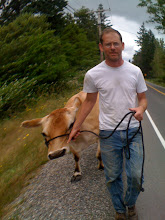I must confess that I have been guilty of acute smugness.
For the past three years, I have stood before you and preached the benefits of eating locally; of growing your own food, of living off the industrial food grid.
Transportation costs are high, global climate change is a huge worry, eating the best possible food you can grow is essential to great health -- these have been my mantras.
The fatal flaw was that on Monday mornings, after giving my homily, I would whip out my cell phone, call my grain supplier in Canada and order pallets of grain for my animals. Pallets. Driven down from Canada. Yes, pallets full.
Surprisingly I was just fine with this for years. The irony never struck me until very recently. I had read years ago about English farming methods of growing fodder crops for livestock. An email a few weeks ago reminded me of this idea -- growing your own food for your animals. What a novel concept. One would think that this would have occurred to me earlier.
So, with the benefit of Google, I managed to locate seed. We have lost this farming tradition here in this country, but Great Britain has not. I found a supplier of large leafy fodder kale in Scotland and a seed company in Dorset that mailed over seeds for mangels (large beets), turnips, chicory for pigs and large cabbages. Open pollinated dent corn was still available in this country and trucked in from Vermont. Tomorrow the field will be plowed and tilled to plant the new crops, with luck by fall there will be a store room filled with food -- local food --- for the animals here.
Accept my apologies. We are all always learning new tricks.
Friday, March 21, 2008
Wednesday, March 5, 2008
Seasons In The Sun
I went out to the sheep paddock this morning to check on the new lambs and take a picture for today's email. A couple of lambs were born the first week of February, then another 8 were born the first two weeks of March, and now there were twins two days ago. A couple of ewes are still to lamb. It is the first few days of Spring, the grass should start growing soon and the deep cold of Winter has passed us. It is the time that lambs should be born.
By the time they are old enough to graze, the grass will have grown high enough. They will feed through the warm summer months and then as the weather winds down again and the grass ceases to grow, we will slaughter them for roast lamb.
It is a great system, one that follows the seasons and just makes sense. I wish that I could take credit for it, but I think that sheep have been working on this concept for quite some time now.
All has been well and good for centuries until enterprising business came into it all. The problem is that if you sell lambs, you want to sell them more than just for a few weeks a year, you want to sell them as early as possible to get the highest prices and sell before your competitors do.
The answer is to ship in frozen lamb from New Zealand, breed your ewes very early in the late summer and push the baby lambs with grain to fatten them up quickly. It works, people love it but it just seems wrong to me. I like following the seasons; it is easier and makes for tastier food.
By the time they are old enough to graze, the grass will have grown high enough. They will feed through the warm summer months and then as the weather winds down again and the grass ceases to grow, we will slaughter them for roast lamb.
It is a great system, one that follows the seasons and just makes sense. I wish that I could take credit for it, but I think that sheep have been working on this concept for quite some time now.
All has been well and good for centuries until enterprising business came into it all. The problem is that if you sell lambs, you want to sell them more than just for a few weeks a year, you want to sell them as early as possible to get the highest prices and sell before your competitors do.
The answer is to ship in frozen lamb from New Zealand, breed your ewes very early in the late summer and push the baby lambs with grain to fatten them up quickly. It works, people love it but it just seems wrong to me. I like following the seasons; it is easier and makes for tastier food.
Subscribe to:
Posts (Atom)

